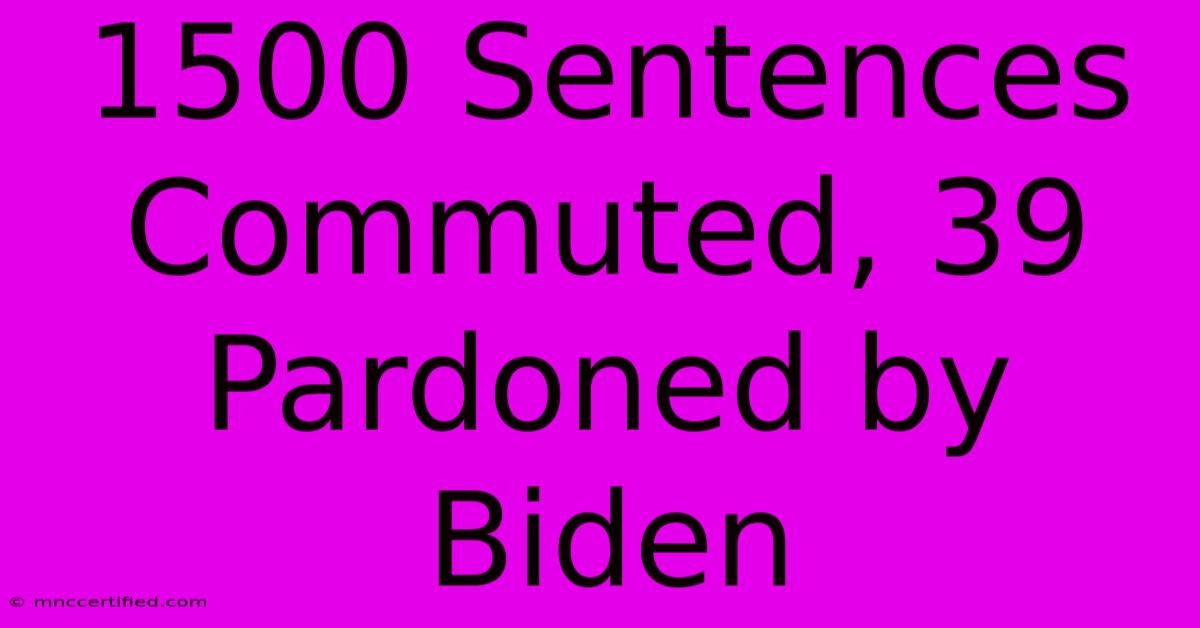1500 Sentences Commuted, 39 Pardoned By Biden

Table of Contents
1500 Sentences Commuted, 39 Pardoned by Biden: A Deep Dive into the President's Clemency Actions
President Biden's recent wave of clemency, encompassing 1500 sentence commutations and 39 pardons, has sparked significant discussion. This article delves into the details of these actions, their implications, and the broader context of presidential clemency power. We'll examine the criteria used, the types of offenses involved, and the ongoing debate surrounding the process.
Understanding Presidential Clemency: Pardons vs. Commutations
Before diving into the specifics of Biden's actions, let's clarify the difference between a pardon and a commutation. Both are forms of presidential clemency, a power granted by Article II, Section 2 of the US Constitution.
-
Pardon: A pardon completely wipes away a criminal conviction. It's as if the crime never happened, restoring all rights and privileges lost due to the conviction. This includes the right to vote, own a firearm, and hold public office.
-
Commutation: A commutation reduces a sentence. It doesn't erase the conviction, but it lessens the time spent in prison or changes the type of punishment. For example, a prison sentence might be commuted to probation.
Biden's actions represent a significant use of his clemency power, focusing primarily on commutations, aiming to address sentencing disparities and provide second chances to individuals.
The Details of Biden's Clemency Grants: Who Benefited?
The 1500 sentence commutations and 39 pardons granted by President Biden targeted specific groups and offenses. While the full list of recipients isn't publicly available in a single, easily accessible document, reports highlight several key themes:
-
Drug-related offenses: A significant portion of the commutations involved individuals convicted of non-violent drug offenses, reflecting the administration's focus on addressing the war on drugs' impact on marginalized communities. This aligns with ongoing efforts to reform sentencing guidelines for drug crimes. The disproportionate impact of these laws on minority populations is a key factor driving this clemency initiative.
-
Focus on rehabilitation: Many recipients had demonstrated significant rehabilitation efforts during their incarceration, suggesting a criteria that prioritizes positive change and future contributions to society. This approach moves beyond simple punishment and emphasizes the potential for positive societal reintegration.
-
Emphasis on fairness and equity: The administration clearly aimed to address past injustices and sentencing disparities. The selection process likely considered factors like length of sentence, time served, and conduct while incarcerated, in addition to the nature of the crime.
-
Limited pardons, heavy emphasis on commutations: The relatively small number of pardons compared to commutations highlights a strategic approach. Commutations address immediate sentencing concerns, while pardons require a more comprehensive review and are generally reserved for more exceptional cases.
The Significance and Impact of Biden's Actions
These clemency actions have several significant implications:
-
Addressing mass incarceration: The large-scale commutation of sentences directly addresses concerns about the high rate of incarceration in the United States, particularly for non-violent offenses.
-
Reforming the criminal justice system: This represents a significant step towards reforming the criminal justice system and addressing systemic inequities.
-
Second chances and rehabilitation: Providing opportunities for rehabilitation and reintegration into society is a crucial aspect of these actions. It recognizes that individuals can change and contribute positively to society after serving their time.
-
Political implications: Biden's actions have drawn both praise and criticism, reflecting the highly politicized nature of criminal justice reform.
The Ongoing Debate and Future Outlook
While widely lauded by many criminal justice reform advocates, Biden's clemency initiative has also faced criticism. Some argue that it doesn't go far enough, while others question the criteria used for selection. The ongoing debate highlights the complexity and sensitivity of presidential clemency decisions and the need for ongoing efforts to improve the criminal justice system.
The future of presidential clemency under the Biden administration remains to be seen. However, this significant wave of commutations and pardons signals a clear commitment to addressing sentencing disparities and offering pathways to rehabilitation for deserving individuals. The transparency of future clemency decisions and the continued push for criminal justice reform will be key factors to watch in the coming years.
Keywords: Biden clemency, presidential pardon, sentence commutation, criminal justice reform, mass incarceration, drug offenses, rehabilitation, sentencing disparities, clemency power, Article II Section 2, US Constitution, non-violent crimes, second chances, political implications.

Thank you for visiting our website wich cover about 1500 Sentences Commuted, 39 Pardoned By Biden. We hope the information provided has been useful to you. Feel free to contact us if you have any questions or need further assistance. See you next time and dont miss to bookmark.
Featured Posts
-
Chat Gpt Adds Santa Voice Chat
Dec 13, 2024
-
Biden Commutes 1500 Sentences
Dec 13, 2024
-
Wardrobing 100 Party Dresses My Story
Dec 13, 2024
-
Max George Hospitalized Heart Condition
Dec 13, 2024
-
No Good Deed A Holiday Comedy Mystery
Dec 13, 2024